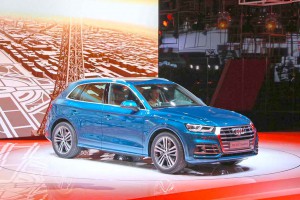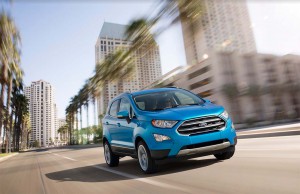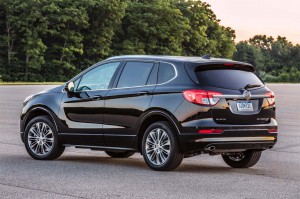Ford’s new EcoSport model is set to become the smallest SUV in the Detroit carmaker’s line-up, but it could fuel the big debate over automotive trade.
That’s because the little EcoSport will roll off a Ford assembly line in India, rather than one in the United States. Ford has also made plans to move all of its small passenger car production from its U.S. operations to a new facility in Mexico – a decision frequently cited by President-elect Donald Trump during his campaign.
The Republican candidate repeatedly warned that he would take steps to block Ford from importing Mexican-made passenger cars, if by no other means than adding hefty tariffs. Since last week’s election, the incoming administration has sent signals it will not only try to tear up NAFTA and block the Trans-Pacific trade deal but it will look at barrier-inducing tariffs against a variety of countries, possibly including China.
Ford is by no means the only automaker that could be impacted should this anti-import rhetoric turned into hard policy. A virtual Who’s-Who of the world’s automakers can be found either operating Mexican production facilities or setting up new plants there.

Audi's next-gen Q5 ute is among the many vehicles now being built in Mexico that could be affected by President-elect Trump's possible tariffs.
Toyota just yesterday broke ground for a new assembly facility in Apaseo el Grande, in the central Mexican state of Guanajuato. It will produce the compact Corolla, the world’s best-selling automobile and routinely one of the best-sellers in the U.S.
Other automakers, including Audi and Kia, have recently gone into production south of the border. A new factory set up by Nissan for its Infiniti luxury model will, in less than two years, begin turning out some Mercedes-Benz products, as well.
In some cases, these facilities will add to existing operations in other parts of the world – the Corolla is also built in Blue Springs, Mississippi, as well as at a factory in Canada, for example. But the new Audi plant will be the world source for the popular Q5 sport-utility vehicle.
Much of the attention in the current trade debate has focused on Mexico, in part because of the role critics contend the North American Free Trade Agreement has played in shifting automotive jobs out of the U.S. What is clear is that Mexico has become one of the five largest national manufacturers of automobiles in the world. But while low wages are a factor, so is the fact that the country has inked more global trade deals than any other nation in the world.
Ford – and other carmakers are so far showing no sign of pulling back from Mexico. William Clay Ford Jr., the automaker’s chairman and great-grandson of Henry Ford, even met with candidate Trump to try to get the then-candidate to drop what Ford called “infuriating” rhetoric. That did little to cool the debate or take Ford out of the bullseye. And it remains to be seen if the EcoSport announcement will fan the fires.
A source close to the carmaker, who wished to remain anonymous to avoid being pulled into the current trade debate, said Ford isn’t intentionally waving a red flag. It identified a yawning new product segment and wanted to get into it as soon as possible, the source explained, adding that many of the market’s other small SUVs are also coming from abroad in order to hold down costs and build a profitable business case.
(Ford scales down with new EcoSport SUV. Click Here for the story.)
“This decision was made a long time ago,” the source explained, adding that, “It has everything to do with Ford’s manufacturing footprint, not the trade battle with Trump.”
Joe Phillippi, head of Auto Trends Consulting, said he hopes the trade dispute will die down, though he fears the EcoSport announcement could raise it back to headline levels. “The automotive business is truly global. So, to make this whole thing work, you have to have a relatively free flow of components and vehicles across borders,” stressed Philippi. “It’s how you keep the costs down”
The EcoSport announcement actually could widen the automotive side of the trade debate, as Ford could now become the first carmaker to begin selling Indian-made vehicles in the U.S. when the first of the utes arrives in 2018. Several other Indian companies have laid out similar plans, but have yet to push into the States.
The 800-pound gorilla of the trade debate, however, is China. That country already runs up a massive trade deficit with the U.S. and it notably has numerous trade restrictions in place to discourage automotive imports. That has led virtually every major global automaker to set up operations in China – and, by law, to do so in partnership with a domestic Chinese auto manufacturer.

Volvo's new S60 debuted at the North American International Auto Show in Detroit and, like the Envision, imported from China.
Until recently, the rapid pace of growth in China’s car market sucked up just about everything the industry could produce, but with the numbers slipping into single digits, that’s encouraging both domestic Chinese and foreign-owned carmakers to start looking at export opportunities.
(Bill Ford congratulates Trump on election victory while in India. Click Here for details.)
Volvo, the Swedish-based but Chinese-owned carmaker, recently became the first to bring a car into the U.S. from a factory in Chengdu, capital of Szechuan province. The stretched S60 Inspiration sedan will soon be followed by a longer version of the new Volvo flagship, the S90, it announced last week.
Meanwhile, Volvo’s parent Geely also made it clear it will push into the U.S. with an all-new mid-range, Chinese-made brand, Lynk & Co. “The goal is somewhere around 2019,” a source close to the carmaker attending this week Los Angeles Auto Show told TheDetroitBureau.com.
General Motors quietly launched its own Chinese import this autumn, the new Buick Envision, like the Ford EcoSport, the smallest SUV in that brand’s line-up. Several company officials have privately said that GM decided to forego the usual, splashy new model media preview for Envision to avoid getting caught up in the trade debate. But GM would like to follow up with other Chinese-made models in the not-too-distant future. As that country’s second-largest automaker, it has lots of capacity to tap.
(To see what auto industry issues will be high on the next President’s agenda, Click Here.)
Ford would also like to get off the radar in the trade debate, viewing sourcing decisions as a part of a global business strategy, not a matter of politics. But with the launch of EcoSport it could find itself back in the spotlight and draw more attention to the auto industry overall.


